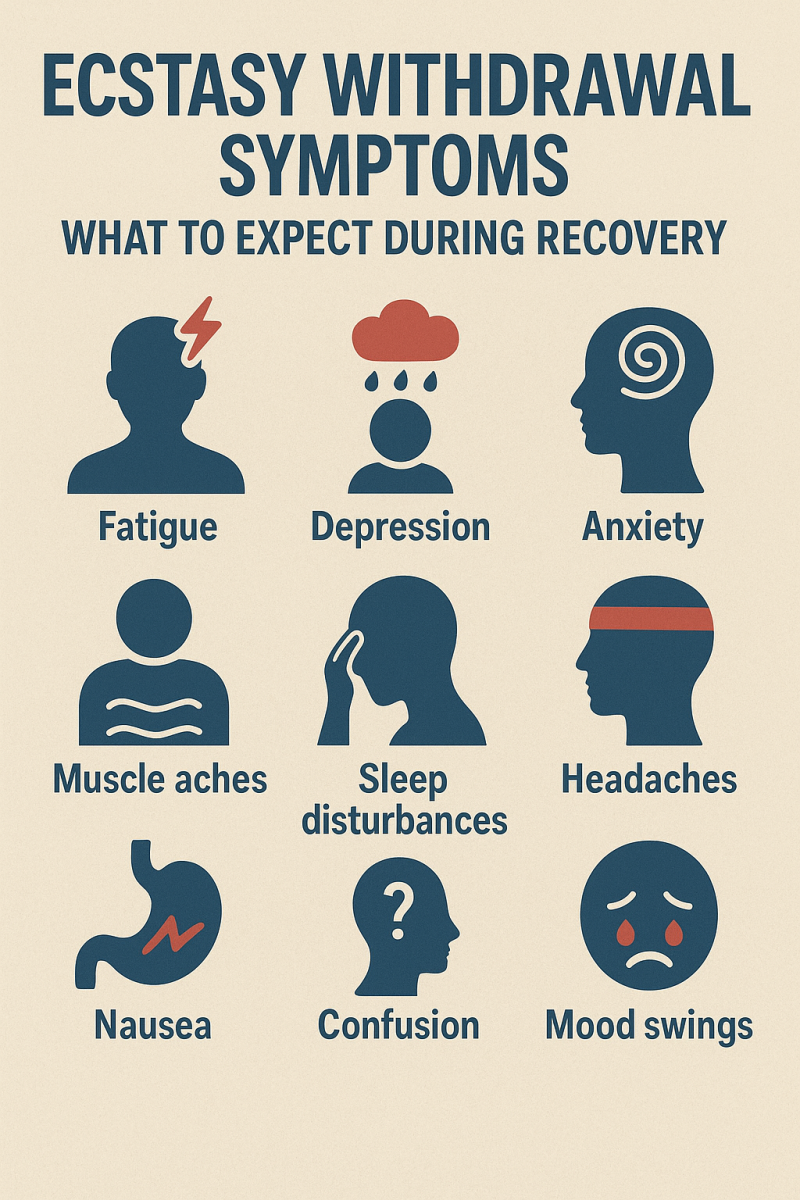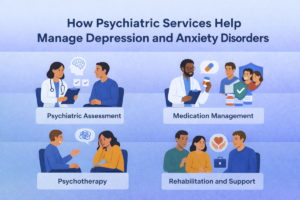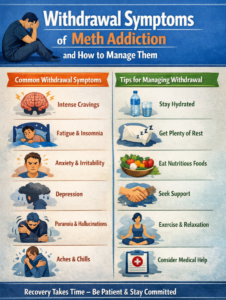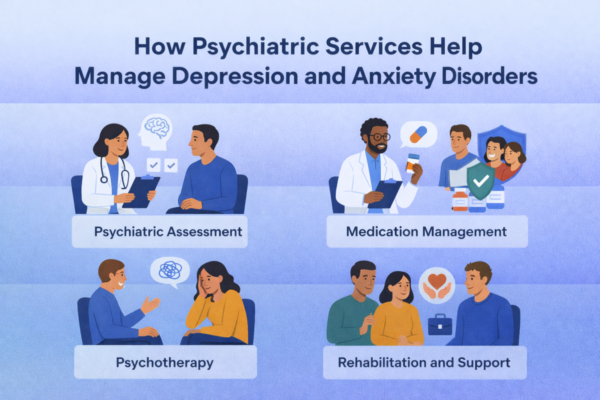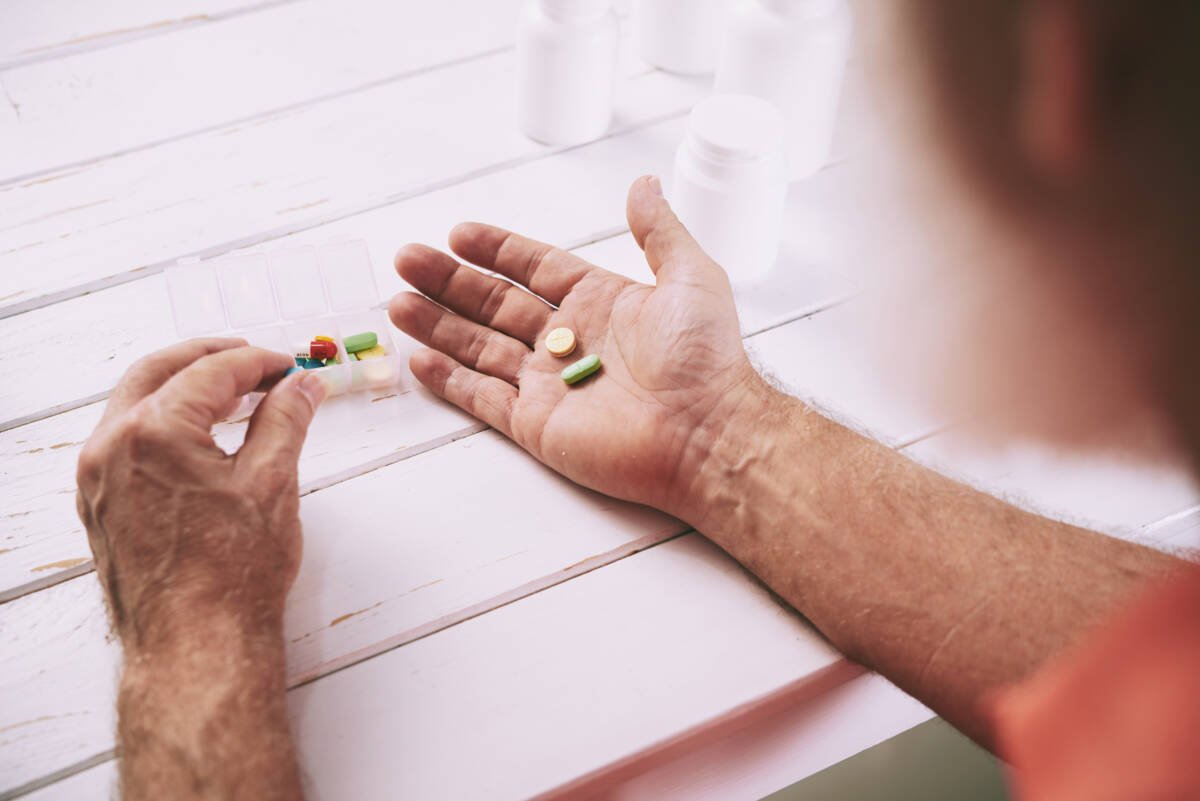What is Ecstasy, and Its Impact to the Brain?
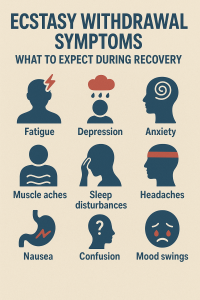
Ecstasy has a direct impact on the neurotransmitters present in the brain, which are serotonin, dopamine, and norepienephrine. These are chemicals that regulate mood, energy and sleep. Emotional instability and dependency The brain finds it difficult to control these chemicals industrially, and thus, the brain turns to be in a state of indecency after consistent use.
This is a chemical imbalance and the cause of much of the ecstasy withdrawal symptoms. It is easier to explain why, during recovery, there should be medical and emotional support through learning how the drug acts.
Typically, the most frequent Ecstasy Withdrawal Symptoms
Discontinuing ecstasy may result in a number of unpleasant withdrawal effects. They can be classified as physical, psychological and emotional.
Physical Withdrawal Symptoms
- Fatigue and low energy
- Insomnia or disturbed sleep
- Muscle aches and jaw tension
- Changes in appetite
- Nausea or dizziness
Psychological Withdrawal Symptoms
- Anxiety and restlessness
- Depression and mood swings
- Difficulty concentrating
- Memory problems
Behavioral and Emotional problems
- Cravings for the drug
- Restlessness and anger.
- Social withdrawal
- Lack of motivation
These symptoms may be mild, chronic, or acute in cases of their use by a person and his or her health status.
Timeline of Ecstasy Withdrawal
The withdrawal symptoms do not happen overnight, they have a chronology.
Initial 24–72 Hours
The initial few days are the worst. Exhaustion, stress and hunger sets in. Insomnia is also experienced in many individuals.
First Week
This period is normally when depression, irritability, and lack of focus/concentration are at full blast. This is where the risk of relapses is the greatest.
Weeks 2–4 and Beyond
The cravings and memory problems, as well as mood problems can be lasted several weeks. These symptoms are gradually reduced as it is professionally assisted.
Risk Factors Which Determine Withdrawal Intensity
The withdrawal affects not all people in a similar way. The intensity is affected by:
- Duration and time of usage of ecstasy.
- General physical and mental wellbeing.
- Obtinence of other substance use.
- Environment and personal stress.
All these are reasons why attempts should not be made to recover all by yourself.
Professional Treatment in Recovery
Getting rid of ecstasy withdrawal is not merely a question of will power, it takes systematic therapy.
Supervised Care and Medical Detox
Medical oversight ties up safety in the process of detox, assists in curbing all health risks and addressing critical illness.
Treatment and Rehabilitation to permanent recovery
Group therapy, cognitive Behavioral Therapy (CBT) and individualized counseling assist in working on the psychological and emotional causes of addiction.
Elaborating on Holistic Modes of healing
The use of meditation and yoga, nutritional therapy and exercise programs enhance well-being and avert relapse.
Why a Female Rehab Centre in Lahore, Pakistan?
Gender-specific treatment is vital to women who have an addiction issue. In Pakistan, female rehab centre at Lahore, women are given special care at a secure and stimulating environment.
Gender-Specific Support Systems
Recovery is more successful under programs that are designed to meet the needs of women; covering trauma, self-esteem, and social pressures.
Caring, Confidential and Sociologically Safety Environment
Privacy and dignity come first, though, with the women feeling free to share their plight.
Specialized Women Programs
Medical detox, therapy and relapse prevention programs are aimed at empowering women and helping them recover.
Changes in Lifestyle to aid in recovery
- Have a well-balanced diet to keep the brain healthy.
- Take frequent exercise.
- Develop good support network with relatives or peer group.
- Be mindful in order to deal with stress.
- Stay away of situations and triggers that promote drug use.
Such way of life practices enforce long term sobriety.
Ecstasy Withdrawal and Recovery: FAQS
1. What is the time of an ecstasy withdrawal?
Depending on the history of usage, withdrawal may take between couple of days and a few weeks.
2. Is it possible that ecstasy withdrawal is hazardous?
Although the symptoms are not typically life-threatening, such as severe depression and insomnia may be hazardous lacking oversees.
3. How can the best management of withdrawal be achieved?
With the help of professional rehab centres, recovery is safer and more effective as the centres provide both medical and emotional help.
4. Why will women prefer to attend a girl rehab centre in Lahore Pakistan?
The centres offer a safe and confident space where they can get specialised and gender-oriented care.
5. Are there any holistic treatments during withdrawal?
Indeed, mental and physical recovery is increased by the use of practices such as yoga, meditation, and nutrition therapy.
6. Do we have a high rate of ecstasy withdrawal failure?
Yes, without backing up recovery with care plans and therapy recovery is likely to relapse.
In conclusion. Hope and Healing
The recovery period to get out of ecstasy addiction is not easy though there can be help. The first one is awareness of the withdrawal symptoms. The second thing is to seek professional assistance in a reliable rehabilitation centre such a female rehab centre in Lahore, Pakistan, and women will be treated with specialized care, safety, and given the incentives they require to lead their lives in the state of being drug-free.
👉 Are you or a loved one on the verge of something, now is the right time to contact them. You can not only recover but can recover.

